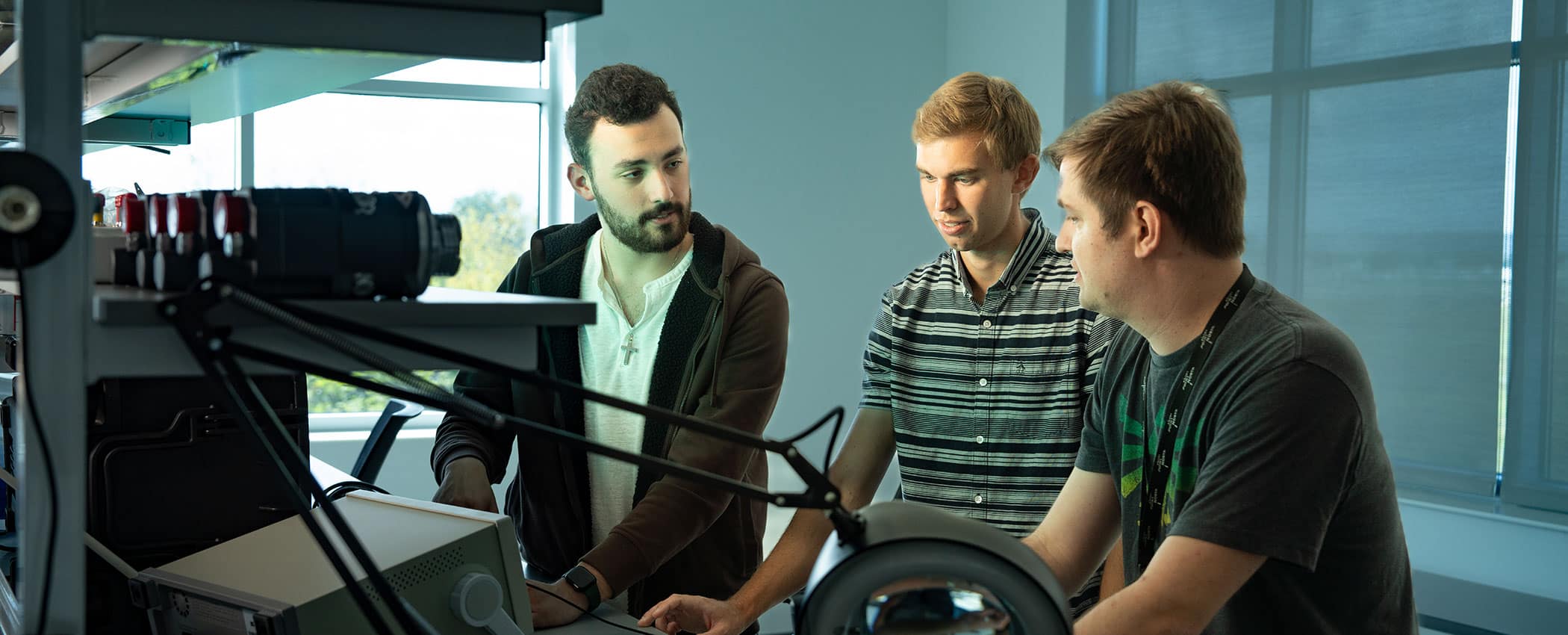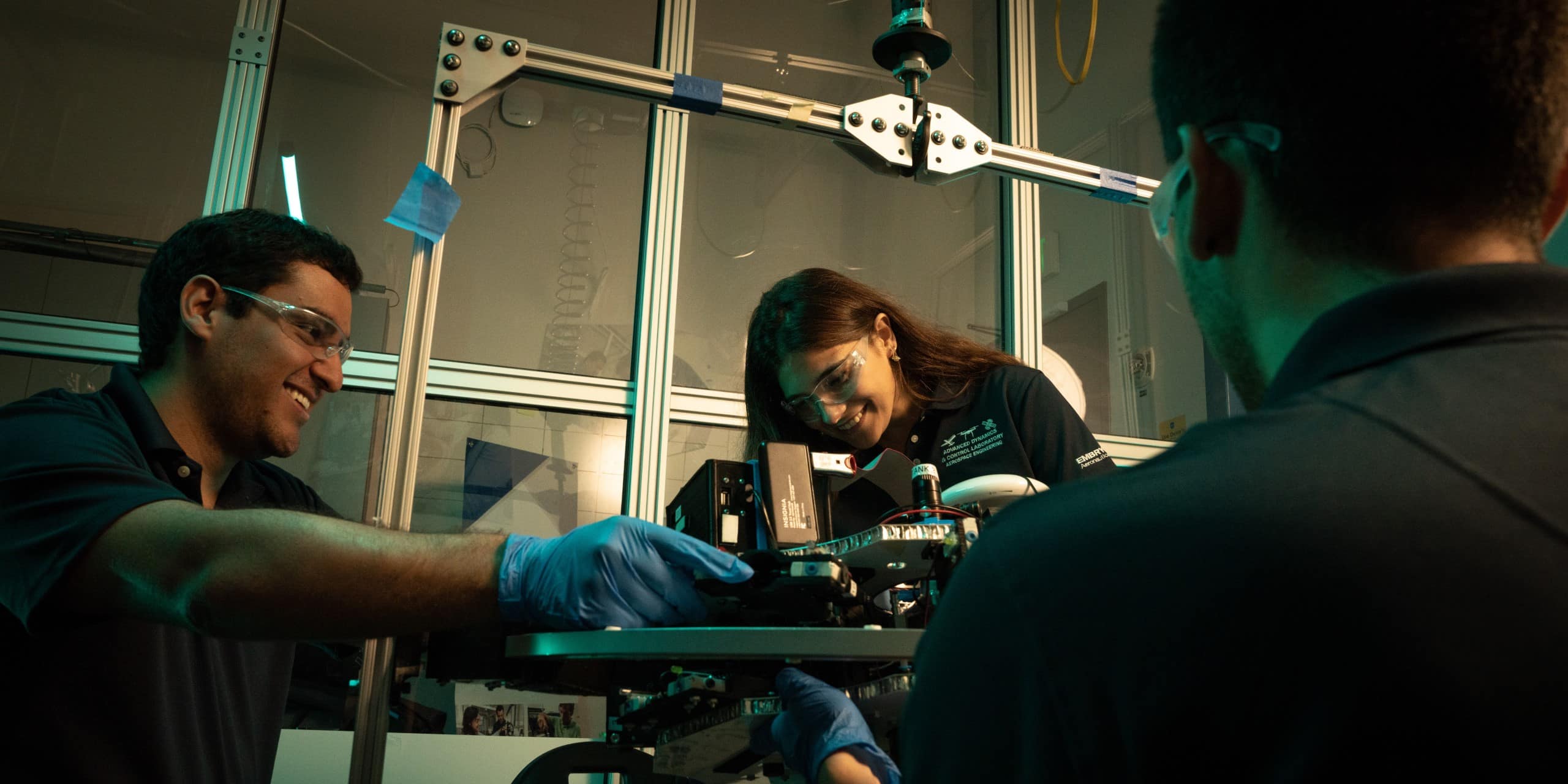
Master of
Systems Engineering
A Master of Systems Engineering provides the foundation of the systems engineering process to develop and implement solutions in complex engineering.
About the Master of Systems Engineering
A Systems Engineering degree will provide a solid foundation of fundamental systems engineering knowledge while also teaching students how to apply a complex systems perspective to business and technology. With extensive backgrounds in managing complex, advanced technology projects, faculty members are subject matter experts who possess a wealth of Systems Engineering experience.
The program curriculum is based on an interdisciplinary engineering approach as envisioned and defined by the International Council on Systems Engineering (INCOSE) and accredited by the Southern Association of Colleges and Schools (SACS).
Student Learning Outcomes
Opportunities available to you while receiving an online master's degree:
- Define systems concepts, including the relations among subsystems
- Apply different types of system architectures
- Evaluate alternatives in developing system concepts
- Analyze the coordination of system life cycle activities and the concurrent development of system elements
- Employ a life cycle process for a given complex system
Systems Engineering Career Opportunities
Careers and Employers
The Embry-Riddle systems engineering graduate program boasts a high 100% placement rate within one year of graduation. Many graduates from the online master's degree transition into positions such as system analysts, logistics engineers, system designers and software engineers.
Systems Engineering graduates tend to enter the industry with companies such as:
- Amazon
- Boeing
- Raytheon Technology
- Lockheed Martin
- Collins Aerospace
- Microsoft
- L3Harris Technologies
Systems Engineering Salary Information
As of 2022, alumni with a degree in engineering management tend to receive competitive salaries, with an average income of $114,500 annually, in the first year after graduation.
DETAILS
About Systems Engineering at the Worldwide & Online Campus
The Master of Systems Engineering program is designed for students who have gained knowledge and experience in a technical discipline, including systems engineering and are looking to broaden their perspective and toolkit. Both traditional students and professionals enter the program with varying levels of experience to understand and apply systems thinking principles and systems engineering tools to different types of complex systems.
Students are immersed in project management, encouraged to incorporate their personal and professional experiences into their coursework, actively engage in teamwork and are prepared to immediately apply new skills on the job.
Tracks/Specialties and/or Certificates
The systems engineering program offers master's students two tracks:
- Technical Track: builds on engineering, technical or physical sciences to enhance systems thinking
- Engineering Management Track: combines the technical aspects of the field with business-oriented coursework for management roles
Systems Engineering Information
- Credits: 30
- Online or In-Person: Fully Online
- Capstone: Capstone Project
Helpful Links
- Attend a Worldwide Virtual Info Session
- Discover the Department's Faculty
- Explore the Fields of Study: Computers & Technology & Engineering
- Find Related Clubs & Organizations
Courses
SYSE 500 Fundamentals of Systems Engineering 3 Credits (3,0)
An introduction to the fundamental principles, processes, and practices associated with the application of Systems Engineering across the system life cycle. Translate needs and priorities into system requirements; derive requirements. Methods and standards; concept definition; interface definition; requirements development and management; system baseline definition and management; system architecture development; integrated schedule management and analysis; risk assessment; systems integration, verification, and validation. Mathematical and graphical tools for system analysis and control, testing and evaluation of system and technology alternatives. Reliability and maintainability, design trade-offs and trade off models.
SYSE 505 System Safety and Certification 3 Credits (3,0)
Concepts, principles, methods and process applied for development of safety-critical and mission-critical software-intensive systems. The issues of system safety, requiring additional analysis and design techniques, are discussed from the perspective of computer hardware and software. The course discusses the safety requirements, hazard and risk analysis, failure modes and effect analysis, fault tolerance, basics of hardware and software reliability, levels of integrity, nature of faults and redundancy, and issues of verification, validation and certification. Safety standards across application domains, including SAE, ARP4754 & ARP4761 and RTCA DO-178C & DO-254 for safety considerations in development of aircraft systems are analyzed. The related certification roles, process, objectives, and activities are discussed. Selected software tools supporting safety and reliability assessment of hardware laboratory experiments with tools, and producing appropriate reports.
SYSE 515 Mathematical Applications in Systems Engineering 3 Credits (3,0)
Applied and context-driven approach to understanding key topics from the calculus, economics and probability and statistics series for engineers. An introduction to fundamental topics in economics, probability and statistics and calculus in the context of systems engineering; analytical skills for system planning, design, and analysis.
SYSE 530 System Requirements Analysis and Modeling 3 Credits (3,0)
The development, definition, and management of requirements for system or product. The system requirements process; requirements elicitation techniques; alternative requirements analysis techniques; requirements specification; requirements verification and validation; requirements management, and requirements standards and tools. Stakeholder identification, risk analysis, trade off analysis as it relates to the requirements.
SYSE 560 Introduction to Systems Engineering Management 3 Credits (3,0)
Fundamental principles of engineering management in the context of systems engineering. Effective technical planning, scheduling, and assessment of technical progress. Techniques for life cycle costing; performance measurement; modern methods of effective engineering management; quality tools; quality management; configuration management; concurrent engineering; risk management; functional analysis; conceptual and detail design assessment; test evaluation. Systems engineering planning and organization; communication and SE management tools and techniques. Development of a Systems Engineering Management Plan, Integrated Master Schedule and/or Integrated Master Plan.
SYSE 610 System Architecture Design and Modeling 3 Credits (3,0)
Concepts and techniques for architecting systems and the process of developing and evaluating architectures. Generating functional, physical, and operational architecture. Modeling and analysis approaches; generation of analyzable architecture models; interface design; architecture frameworks; enterprise engineering; design for reliability, maintainability, usability, supportability, producibility, disposability, and life cycle costs; validation and verification of systems architecture; the analysis of complexity; methods of decomposition and re-integration; trade-offs between optimality and reusability; the effective application of COTS; and practical heuristics for developing good architectures.
SYSE 625 System Quality Assurance 3 Credits (3,0)
Principles and techniques of planning, organizing, controlling, and improving the quality, safety, reliability, and supportability of a system throughout the system life cycle. Establishing a baseline control; cognitive systems engineering and the human-systems integration in complex systems environments. Methods of developing fitness for use; quality costs; quality planning; statistical analysis and control; experimental design for quality improvement; System Reliability, Maintainability, and Availability; applied quality programs such as ISO 9001:2000, ISO 14001, CMMI.
SYSE 660 Organizational Systems Management 3 Credits (3,0)
Concepts of organizational management and leadership from a systems and complex systems perspective. Strategic management; organizational transformation; organizational environments. Modeling of marketing, finance, organizational behavior, and strategic and operational management.
SYSE 697 Systems Engineering Project 3 Credits (3,0)
A project in systems engineering as a conclusion of the academic coursework for the MSYSE program. Culminate in a written document that will demonstrate the student's proficiency in the chosen project topic and must be of a quality suitable for publication. Pre-Requisite: Students must be admitted to MYSE and must have completed all other program course requirements including the approved elective set.
Get Started Now:
Summary
30 Credits
Estimate your tuition by using the Tuition Calculator
View Financial Aid Information
Learn more about the benefits of an Online Degree
Learn about our General Education
Find out about transferring credits to this degree
Learn more about our Veterans & Military benefits
View our Academic Calendar
Search Courses for this degree



